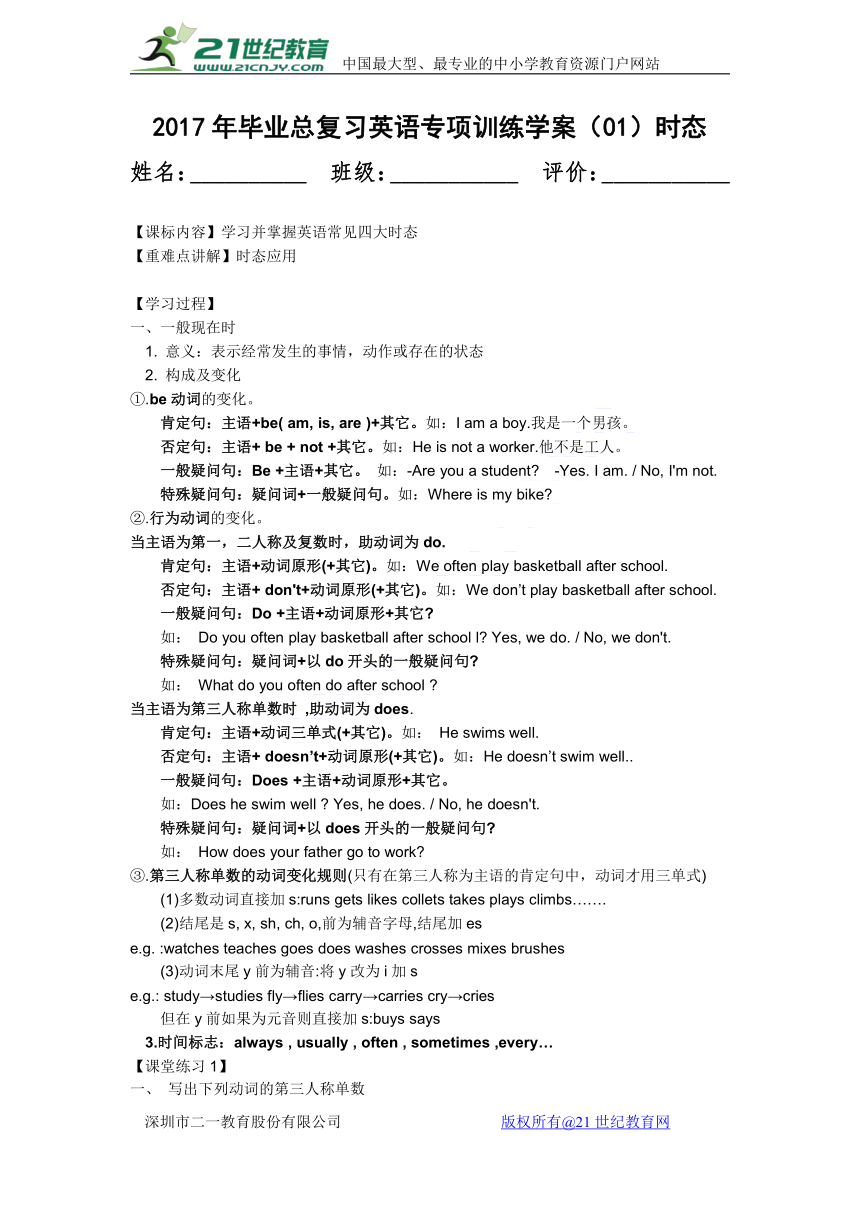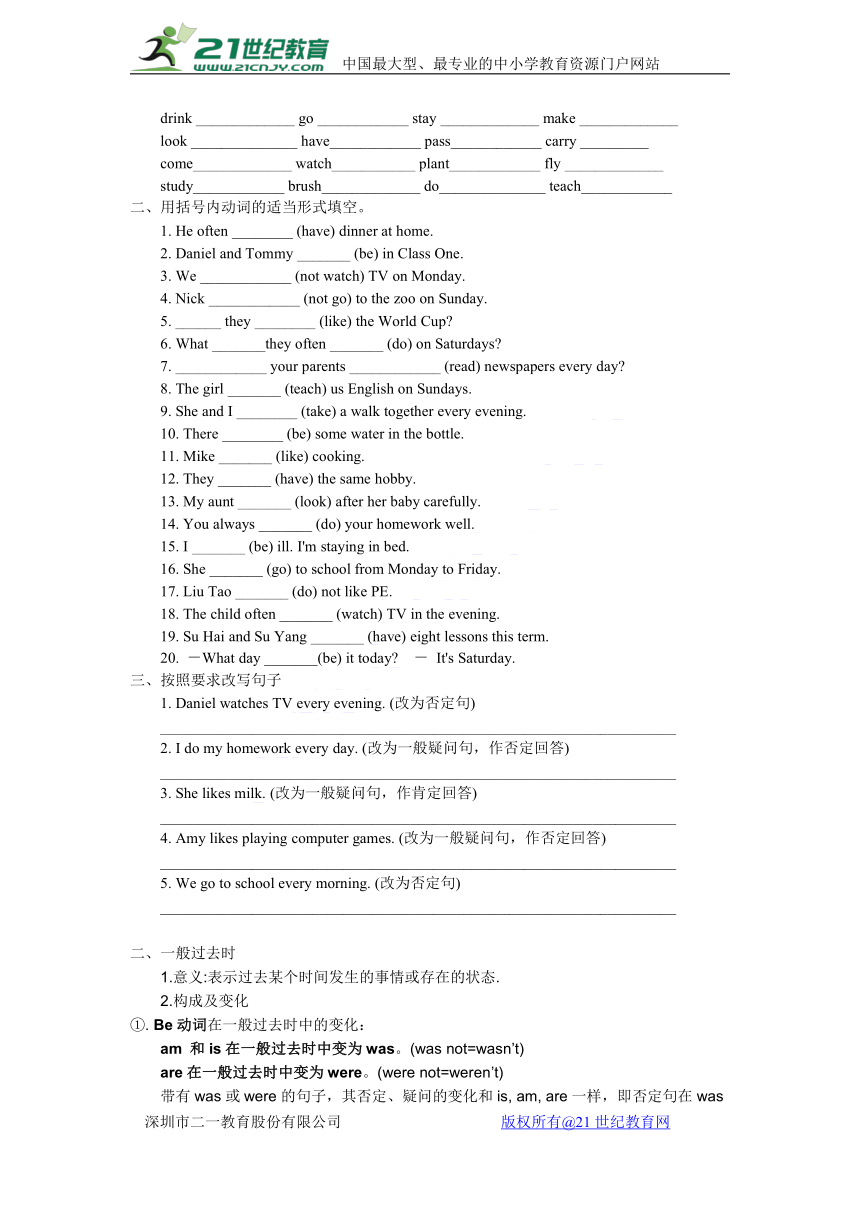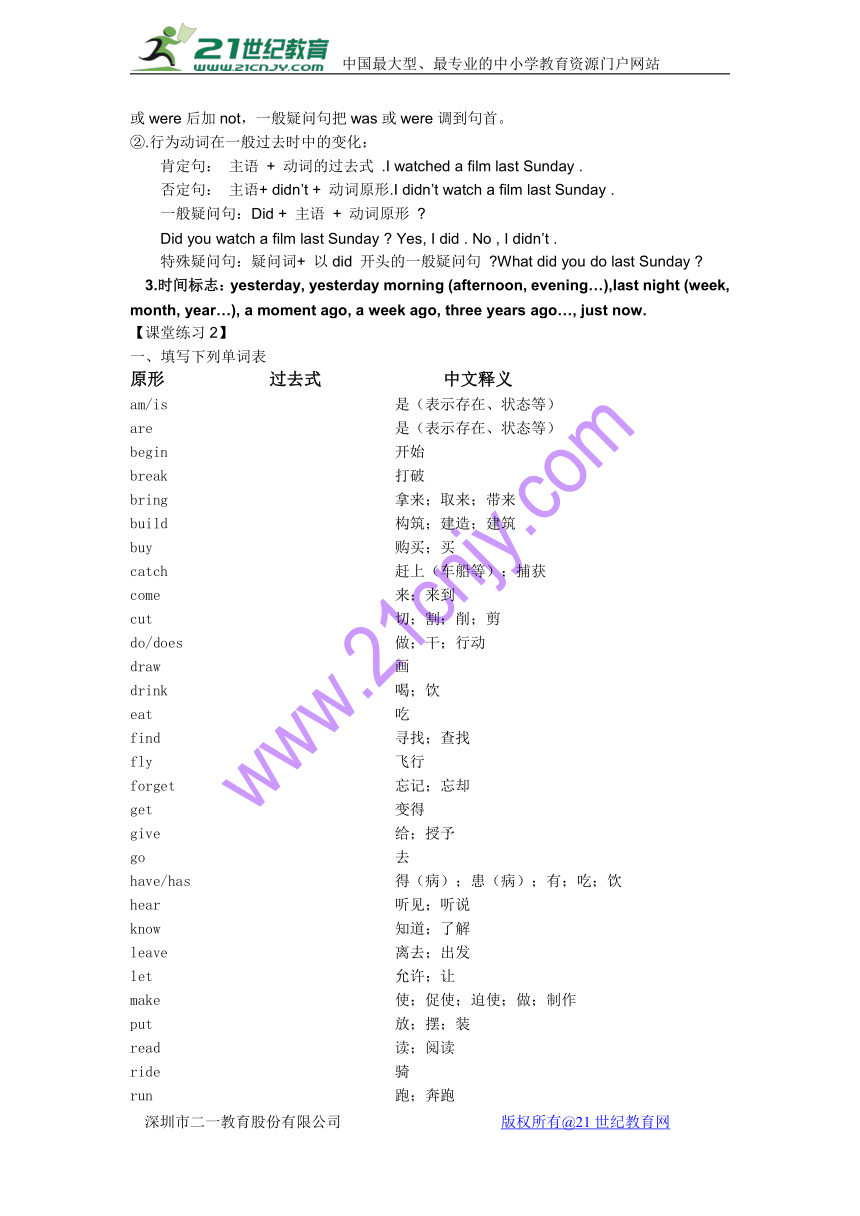外研版(一年级起点)小升初时态练习学案(无答案)
文档属性
| 名称 | 外研版(一年级起点)小升初时态练习学案(无答案) |

|
|
| 格式 | zip | ||
| 文件大小 | 129.8KB | ||
| 资源类型 | 教案 | ||
| 版本资源 | 外研版(一年级起点) | ||
| 科目 | 英语 | ||
| 更新时间 | 2017-07-01 00:00:00 | ||
图片预览



文档简介
2017年毕业总复习英语专项训练学案(01)时态
姓名:__________ 班级:___________ 评价:___________
【课标内容】学习并掌握英语常见四大时态
【重难点讲解】时态应用
【学习过程】
一、一般现在时 1. 意义:表示经常发生的事情,动作或存在的状态 2. 构成及变化
①.be动词的变化。 肯定句:主语+be( am, is, are )+其它。如:I am a boy.我是一个男孩。 否定句:主语+ be + not +其它。如:He is not a worker.他不是工人。 一般疑问句:Be +主语+其它。 如:-Are you a student? -Yes. I am. / No, I'm not. 特殊疑问句:疑问词+一般疑问句。如:Where is my bike?【来源:21·世纪·教育·网】
②.行为动词的变化。
当主语为第一,二人称及复数时,助动词为do. 肯定句:主语+动词原形(+其它)。如:We often play basketball after school. 否定句:主语+ don't+动词原形(+其它)。如:We don’t play basketball after school. 一般疑问句:Do +主语+动词原形+其它? 如: Do you often play basketball after school l? Yes, we do. / No, we don't. 特殊疑问句:疑问词+以do开头的一般疑问句? 如: What do you often do after school ?2·1·c·n·j·y
当主语为第三人称单数时 ,助动词为does.
肯定句:主语+动词三单式(+其它)。如: He swims well. 否定句:主语+ doesn’t+动词原形(+其它)。如:He doesn’t swim well.. 一般疑问句:Does +主语+动词原形+其它。 如:Does he swim well ? Yes, he does. / No, he doesn't. 特殊疑问句:疑问词+以does开头的一般疑问句? 如: How does your father go to work?????????????????? ③.第三人称单数的动词变化规则(只有在第三人称为主语的肯定句中,动词才用三单式) (1)多数动词直接加s:runs gets likes collets takes plays climbs……. (2)结尾是s, x, sh, ch, o,前为辅音字母,结尾加es
e.g. :watches teaches goes does washes crosses mixes brushes (3)动词末尾y前为辅音:将y改为i加s
e.g.: study→studies fly→flies carry→carries cry→cries 但在y前如果为元音则直接加s:buys says 3.时间标志:always , usually , often , sometimes ,every…? 【课堂练习1】
一、 写出下列动词的第三人称单数
drink _____________ go ____________ stay _____________ make _____________
look ______________ have____________ pass____________ carry _________
come_____________ watch___________ plant____________ fly _____________
study____________ brush_____________ do______________ teach____________
二、用括号内动词的适当形式填空。
1. He often ________ (have) dinner at home.
2. Daniel and Tommy _______ (be) in Class One.
3. We ____________ (not watch) TV on Monday.
4. Nick ____________ (not go) to the zoo on Sunday.
5. ______ they ________ (like) the World Cup?
6. What _______they often _______ (do) on Saturdays?21教育网
7. ____________ your parents ____________ (read) newspapers every day?
8. The girl _______ (teach) us English on Sundays.
9. She and I ________ (take) a walk together every evening.
10. There ________ (be) some water in the bottle.
11. Mike _______ (like) cooking.
12. They _______ (have) the same hobby.
13. My aunt _______ (look) after her baby carefully.
14. You always _______ (do) your homework well.
15. I _______ (be) ill. I'm staying in bed.
16. She _______ (go) to school from Monday to Friday.21*cnjy*com
17. Liu Tao _______ (do) not like PE.
18. The child often _______ (watch) TV in the evening.
19. Su Hai and Su Yang _______ (have) eight lessons this term.
20. -What day _______(be) it today? - It's Saturday.
三、按照要求改写句子
1. Daniel watches TV every evening. (改为否定句)
____________________________________________________________________
2. I do my homework every day. (改为一般疑问句,作否定回答)
____________________________________________________________________
3. She likes milk. (改为一般疑问句,作肯定回答)
____________________________________________________________________
4. Amy likes playing computer games. (改为一般疑问句,作否定回答)
____________________________________________________________________
5. We go to school every morning. (改为否定句)
____________________________________________________________________
二、一般过去时 1.意义:表示过去某个时间发生的事情或存在的状态. 2.构成及变化
①. Be动词在一般过去时中的变化: am 和is在一般过去时中变为was。(was not=wasn’t) are在一般过去时中变为were。(were not=weren’t) 带有was或were的句子,其否定、疑问的变化和is, am, are一样,即否定句在was或were后加not,一般疑问句把was或were调到句首。 ②.行为动词在一般过去时中的变化: 肯定句: 主语 + 动词的过去式 .I watched a film last Sunday . 否定句: 主语+ didn’t + 动词原形.I didn’t watch a film last Sunday . 一般疑问句:Did + 主语 + 动词原形 ? Did you watch a film last Sunday ? Yes, I did . No , I didn’t . 特殊疑问句:疑问词+ 以did 开头的一般疑问句 ?What did you do last Sunday ? 3.时间标志:yesterday, yesterday morning (afternoon, evening…),last night (week, month, year…), a moment ago, a week ago, three years ago…, just now. 【课堂练习2】21教育名师原创作品
一、填写下列单词表
原形 过去式 中文释义
am/is 是(表示存在、状态等)
are 是(表示存在、状态等)
begin 开始
break 打破
bring 拿来;取来;带来
build 构筑;建造;建筑
buy 购买;买
catch 赶上(车船等);捕获
come 来;来到
cut 切;割;削;剪
do/does 做;干;行动
draw 画
drink 喝;饮
eat 吃
find 寻找;查找
fly 飞行
forget 忘记;忘却
get 变得
give 给;授予
go 去
have/has 得(病);患(病);有;吃;饮
hear 听见;听说
know 知道;了解
leave 离去;出发
let 允许;让
make 使;促使;迫使;做;制作
put 放;摆;装
read 读;阅读
ride 骑
run 跑;奔跑
say 说;讲
see 看见
send 发送;寄;派;遣
sing 唱;唱歌
sit 坐
sleep 睡;睡觉
speak 说;说话
swim 游泳
take 搭乘;花费(时间);拿走;带到
teach 教;讲授
tell 告诉;讲述
think 想;思考
win 赢;获胜
write 书写
二、单项选择。 ( )1. My father______ill yesterday.
A. isn't B. aren't C. wasn't D. weren'twww-2-1-cnjy-com
( )2. ______your parents at home last week﹖
A. Is B. Was C. Are D. Were【版权所有:21教育】
( )3. The twins____in Dalian last year. They______here now.
A. are; were B. were; are C. was; are D. were; was
( )4. ____your father at work the day__yesterday(前天)﹖www.21-cn-jy.com
A. Was; before B. Is; before C. Was; after D. Is; after
( )5. —Who was on duty last Friday﹖ —______.
A. I am B. I was C. Yes, I was D. No, I wasn't
三、请用正确动词形式填空。
1. I _________ (have) an exciting party last weekend.
2. _________ she _________ (practice) her guitar yesterday? No, she _________.
3. What ________ Tom ________ (do) on Saturday evening?
He ________ (watch) TV and __________ (read) an interesting book.
4. They all _________ (go) to the mountains yesterday morning.
5. She _________ (not visit) her aunt last weekend.
She ________ (stay) at home and _________ (do) some cleaning.
三、一般将来时 1.意义:表示将来某个时间要发生的动作或存在的状态,也表示将来经常或重复发生的动作。 2. 构成及变化:一般将来时常用的两种结构 be going to+动词原形: 表示打算、准备做的事或即将发生或肯定要发生的事。 shall/will+动词原形: 表示将要发生的动作或情况,没有太多的计划性, 还用来表示意愿 ①. be going to +动词原形 肯定句 主语+be(am /,is,/ are) going to +动词原形+其它成份 My sister is going to learn English next year. 我姐姐准备明年学英语。 否定句 主语+be(am / is / are)not going to +动词原形 +其它成份 I am not going to(go to)the cinema tonight. 我今天晚上不打算去看电影。 一般疑问句 Be (am / is / are)+主语+going to+动词原型+其它成份…? Is your father going to play basketball with you? No , he isn’t.你父亲打算和你去打篮球吗?不。 特殊疑问句 特殊疑问词(Wh-)+一般疑问句 ? Where are you going to spend Spring Festival.? 春节你打算在哪过? 注意: be going to 结构后面习惯上不跟go,come 等表位移的动词,一般用该动词的进行时形式表示。如: He’s going to New York next week.下周他要去纽约。
②.will /shall +动词原形(在书面语中,主语是第一人称时,常用shall ,在口语中,所有人称都可以用will) 肯定句 主语+will/shall+动词原形+其它成份 I (shall) write to him next week. 下周我将给他写信。 否定句 主语 + will /shall+ not + 动词原形 +其它成份 They won’t watch TV this evening.今天晚上他们不看电视。 一般疑问句 will/shall+主语 +动词原形+其它成份 Will you stay at home with us tomorrow ? 明天你和我们呆在家里好吗? 特殊疑问句 特殊疑问词(Wh-) +一般疑问句 When will your father be back? 你爸爸什么时候回来? (*)3.附 :Shall I /we …常用来征求对方意见,而问对方是否愿意,或者表示客气的邀请,常用Will you…? 他们的回答比较灵活。 ①.Shall we go to the park ? 肯定Sure , let’s go . 否定 No , let’s go to the cinema. ②.Will you please come to my birthday party next week ? 肯定Yes, I will. / Sure. 否定 I’m sorry. I’m afraid I can’t.
4. 时间标志:tomorrow, soon, next Monday, next year, next weekend, this afternoon, this evening, in+段时间
【课堂练习3】
一.填空
1. My brother __________ (go) to Shanghai next week.【出处:21教育名师】
2. Mary ____________ (see) her grandfather tomorrow.
3. David ____________ (fly) kites in the park this weekend.
4. I___________ (make) a plan for English study in three days.
5. Who ___________ (be) going to learn a new song next Tuesday?
6. ___________ (be) you going to Beijing tomorrow?
7. We ___________ (not be) going to have lunch at 12:00 tomorrow.
8. Where ___________ you ___________ (leave) for tomorrow?【来源:21cnj*y.co*m】
9. ___________ Tom ___________ (have) a P.E. lesson next Monday?
10. What ___________ they ___________ (watch) in the gym tomorrow?
11. What _________ they ___________ (do) tomorrow?
12. The boy ___________ (not have) an English lesson tomorrow.21·cn·jy·com
13. ____________ you ___________ (learn) Chinese next week?21cnjy.com
14. I ____________ (arrive) there tomorrow.
15. Mike _____________ ( not watch ) a movie tomorrow .21*cnjy*com
二.选择填空
1. (? ???) She is going to ________ after school.
A. listening to music????B. listens to music C. listen to music????? D. listened to music
2. (????) We _______ in Beijing in two days.
A. will arrives????????? B. arrives??? C. are going to arrive????????D. arriving
3. (????) The students ________ dumplings tomorrow.21·世纪*教育网
A. is going to making?????B. are making??? C. will make D. are make
4. (????) Are you going to_________ thirteen years old next year?
?A. will be??????? B. are????????? C. be??????? D. go
5. (????) ___will see a play in 5 days?
A. When???????? B. What?????? C. Who???? D. Whose
6. (????) Mary______ English next year.
A. will learn??? B. will to learn??? C. going to learn. ? D. learns
7. (????) He’ll _____ shopping this afternoon.
A. going???????? B. go????????? ? C. goes???? D. went21世纪教育网版权所有
8. (????) ?Will you ____ at the bus stop at 10:30?2-1-c-n-j-y
A. meeting?????? B. meets???????? C. meet???? D. met
9. (????) Lily and I _______ the guitar next week.
A. am going to play???B. are going to play????C. will plays??? D. play
10. (????) How ______ Jenny ___ home tomorrow?
A. does......go????? B. is……going?????? C. will……go??? D. do……go?
11. (????) ?Who is going to _________ a song?
A. sings???? B. singing??? C. to sing???? D. sing
12. (????) I _________in Beijing in three days.
A.?are going to arrive?? B. arrive?? C. will arrive?? D. arrives
13. (????) He _______some model planes tomorrow.
A.?going to make?? B. is making?? C. will make?? D makes
14. (????) Are you going to ___________a doctor next year ?
?A. will be??? B. Are????? C. be????? D. are going to
15. (????) She ________ you make supper this evening.
?A. helps???? B. will help?? C. is helping?? D. is going help
【课堂总结】
_____________________________________________________________________________________________________________________________________________________________。
姓名:__________ 班级:___________ 评价:___________
【课标内容】学习并掌握英语常见四大时态
【重难点讲解】时态应用
【学习过程】
一、一般现在时 1. 意义:表示经常发生的事情,动作或存在的状态 2. 构成及变化
①.be动词的变化。 肯定句:主语+be( am, is, are )+其它。如:I am a boy.我是一个男孩。 否定句:主语+ be + not +其它。如:He is not a worker.他不是工人。 一般疑问句:Be +主语+其它。 如:-Are you a student? -Yes. I am. / No, I'm not. 特殊疑问句:疑问词+一般疑问句。如:Where is my bike?【来源:21·世纪·教育·网】
②.行为动词的变化。
当主语为第一,二人称及复数时,助动词为do. 肯定句:主语+动词原形(+其它)。如:We often play basketball after school. 否定句:主语+ don't+动词原形(+其它)。如:We don’t play basketball after school. 一般疑问句:Do +主语+动词原形+其它? 如: Do you often play basketball after school l? Yes, we do. / No, we don't. 特殊疑问句:疑问词+以do开头的一般疑问句? 如: What do you often do after school ?2·1·c·n·j·y
当主语为第三人称单数时 ,助动词为does.
肯定句:主语+动词三单式(+其它)。如: He swims well. 否定句:主语+ doesn’t+动词原形(+其它)。如:He doesn’t swim well.. 一般疑问句:Does +主语+动词原形+其它。 如:Does he swim well ? Yes, he does. / No, he doesn't. 特殊疑问句:疑问词+以does开头的一般疑问句? 如: How does your father go to work?????????????????? ③.第三人称单数的动词变化规则(只有在第三人称为主语的肯定句中,动词才用三单式) (1)多数动词直接加s:runs gets likes collets takes plays climbs……. (2)结尾是s, x, sh, ch, o,前为辅音字母,结尾加es
e.g. :watches teaches goes does washes crosses mixes brushes (3)动词末尾y前为辅音:将y改为i加s
e.g.: study→studies fly→flies carry→carries cry→cries 但在y前如果为元音则直接加s:buys says 3.时间标志:always , usually , often , sometimes ,every…? 【课堂练习1】
一、 写出下列动词的第三人称单数
drink _____________ go ____________ stay _____________ make _____________
look ______________ have____________ pass____________ carry _________
come_____________ watch___________ plant____________ fly _____________
study____________ brush_____________ do______________ teach____________
二、用括号内动词的适当形式填空。
1. He often ________ (have) dinner at home.
2. Daniel and Tommy _______ (be) in Class One.
3. We ____________ (not watch) TV on Monday.
4. Nick ____________ (not go) to the zoo on Sunday.
5. ______ they ________ (like) the World Cup?
6. What _______they often _______ (do) on Saturdays?21教育网
7. ____________ your parents ____________ (read) newspapers every day?
8. The girl _______ (teach) us English on Sundays.
9. She and I ________ (take) a walk together every evening.
10. There ________ (be) some water in the bottle.
11. Mike _______ (like) cooking.
12. They _______ (have) the same hobby.
13. My aunt _______ (look) after her baby carefully.
14. You always _______ (do) your homework well.
15. I _______ (be) ill. I'm staying in bed.
16. She _______ (go) to school from Monday to Friday.21*cnjy*com
17. Liu Tao _______ (do) not like PE.
18. The child often _______ (watch) TV in the evening.
19. Su Hai and Su Yang _______ (have) eight lessons this term.
20. -What day _______(be) it today? - It's Saturday.
三、按照要求改写句子
1. Daniel watches TV every evening. (改为否定句)
____________________________________________________________________
2. I do my homework every day. (改为一般疑问句,作否定回答)
____________________________________________________________________
3. She likes milk. (改为一般疑问句,作肯定回答)
____________________________________________________________________
4. Amy likes playing computer games. (改为一般疑问句,作否定回答)
____________________________________________________________________
5. We go to school every morning. (改为否定句)
____________________________________________________________________
二、一般过去时 1.意义:表示过去某个时间发生的事情或存在的状态. 2.构成及变化
①. Be动词在一般过去时中的变化: am 和is在一般过去时中变为was。(was not=wasn’t) are在一般过去时中变为were。(were not=weren’t) 带有was或were的句子,其否定、疑问的变化和is, am, are一样,即否定句在was或were后加not,一般疑问句把was或were调到句首。 ②.行为动词在一般过去时中的变化: 肯定句: 主语 + 动词的过去式 .I watched a film last Sunday . 否定句: 主语+ didn’t + 动词原形.I didn’t watch a film last Sunday . 一般疑问句:Did + 主语 + 动词原形 ? Did you watch a film last Sunday ? Yes, I did . No , I didn’t . 特殊疑问句:疑问词+ 以did 开头的一般疑问句 ?What did you do last Sunday ? 3.时间标志:yesterday, yesterday morning (afternoon, evening…),last night (week, month, year…), a moment ago, a week ago, three years ago…, just now. 【课堂练习2】21教育名师原创作品
一、填写下列单词表
原形 过去式 中文释义
am/is 是(表示存在、状态等)
are 是(表示存在、状态等)
begin 开始
break 打破
bring 拿来;取来;带来
build 构筑;建造;建筑
buy 购买;买
catch 赶上(车船等);捕获
come 来;来到
cut 切;割;削;剪
do/does 做;干;行动
draw 画
drink 喝;饮
eat 吃
find 寻找;查找
fly 飞行
forget 忘记;忘却
get 变得
give 给;授予
go 去
have/has 得(病);患(病);有;吃;饮
hear 听见;听说
know 知道;了解
leave 离去;出发
let 允许;让
make 使;促使;迫使;做;制作
put 放;摆;装
read 读;阅读
ride 骑
run 跑;奔跑
say 说;讲
see 看见
send 发送;寄;派;遣
sing 唱;唱歌
sit 坐
sleep 睡;睡觉
speak 说;说话
swim 游泳
take 搭乘;花费(时间);拿走;带到
teach 教;讲授
tell 告诉;讲述
think 想;思考
win 赢;获胜
write 书写
二、单项选择。 ( )1. My father______ill yesterday.
A. isn't B. aren't C. wasn't D. weren'twww-2-1-cnjy-com
( )2. ______your parents at home last week﹖
A. Is B. Was C. Are D. Were【版权所有:21教育】
( )3. The twins____in Dalian last year. They______here now.
A. are; were B. were; are C. was; are D. were; was
( )4. ____your father at work the day__yesterday(前天)﹖www.21-cn-jy.com
A. Was; before B. Is; before C. Was; after D. Is; after
( )5. —Who was on duty last Friday﹖ —______.
A. I am B. I was C. Yes, I was D. No, I wasn't
三、请用正确动词形式填空。
1. I _________ (have) an exciting party last weekend.
2. _________ she _________ (practice) her guitar yesterday? No, she _________.
3. What ________ Tom ________ (do) on Saturday evening?
He ________ (watch) TV and __________ (read) an interesting book.
4. They all _________ (go) to the mountains yesterday morning.
5. She _________ (not visit) her aunt last weekend.
She ________ (stay) at home and _________ (do) some cleaning.
三、一般将来时 1.意义:表示将来某个时间要发生的动作或存在的状态,也表示将来经常或重复发生的动作。 2. 构成及变化:一般将来时常用的两种结构 be going to+动词原形: 表示打算、准备做的事或即将发生或肯定要发生的事。 shall/will+动词原形: 表示将要发生的动作或情况,没有太多的计划性, 还用来表示意愿 ①. be going to +动词原形 肯定句 主语+be(am /,is,/ are) going to +动词原形+其它成份 My sister is going to learn English next year. 我姐姐准备明年学英语。 否定句 主语+be(am / is / are)not going to +动词原形 +其它成份 I am not going to(go to)the cinema tonight. 我今天晚上不打算去看电影。 一般疑问句 Be (am / is / are)+主语+going to+动词原型+其它成份…? Is your father going to play basketball with you? No , he isn’t.你父亲打算和你去打篮球吗?不。 特殊疑问句 特殊疑问词(Wh-)+一般疑问句 ? Where are you going to spend Spring Festival.? 春节你打算在哪过? 注意: be going to 结构后面习惯上不跟go,come 等表位移的动词,一般用该动词的进行时形式表示。如: He’s going to New York next week.下周他要去纽约。
②.will /shall +动词原形(在书面语中,主语是第一人称时,常用shall ,在口语中,所有人称都可以用will) 肯定句 主语+will/shall+动词原形+其它成份 I (shall) write to him next week. 下周我将给他写信。 否定句 主语 + will /shall+ not + 动词原形 +其它成份 They won’t watch TV this evening.今天晚上他们不看电视。 一般疑问句 will/shall+主语 +动词原形+其它成份 Will you stay at home with us tomorrow ? 明天你和我们呆在家里好吗? 特殊疑问句 特殊疑问词(Wh-) +一般疑问句 When will your father be back? 你爸爸什么时候回来? (*)3.附 :Shall I /we …常用来征求对方意见,而问对方是否愿意,或者表示客气的邀请,常用Will you…? 他们的回答比较灵活。 ①.Shall we go to the park ? 肯定Sure , let’s go . 否定 No , let’s go to the cinema. ②.Will you please come to my birthday party next week ? 肯定Yes, I will. / Sure. 否定 I’m sorry. I’m afraid I can’t.
4. 时间标志:tomorrow, soon, next Monday, next year, next weekend, this afternoon, this evening, in+段时间
【课堂练习3】
一.填空
1. My brother __________ (go) to Shanghai next week.【出处:21教育名师】
2. Mary ____________ (see) her grandfather tomorrow.
3. David ____________ (fly) kites in the park this weekend.
4. I___________ (make) a plan for English study in three days.
5. Who ___________ (be) going to learn a new song next Tuesday?
6. ___________ (be) you going to Beijing tomorrow?
7. We ___________ (not be) going to have lunch at 12:00 tomorrow.
8. Where ___________ you ___________ (leave) for tomorrow?【来源:21cnj*y.co*m】
9. ___________ Tom ___________ (have) a P.E. lesson next Monday?
10. What ___________ they ___________ (watch) in the gym tomorrow?
11. What _________ they ___________ (do) tomorrow?
12. The boy ___________ (not have) an English lesson tomorrow.21·cn·jy·com
13. ____________ you ___________ (learn) Chinese next week?21cnjy.com
14. I ____________ (arrive) there tomorrow.
15. Mike _____________ ( not watch ) a movie tomorrow .21*cnjy*com
二.选择填空
1. (? ???) She is going to ________ after school.
A. listening to music????B. listens to music C. listen to music????? D. listened to music
2. (????) We _______ in Beijing in two days.
A. will arrives????????? B. arrives??? C. are going to arrive????????D. arriving
3. (????) The students ________ dumplings tomorrow.21·世纪*教育网
A. is going to making?????B. are making??? C. will make D. are make
4. (????) Are you going to_________ thirteen years old next year?
?A. will be??????? B. are????????? C. be??????? D. go
5. (????) ___will see a play in 5 days?
A. When???????? B. What?????? C. Who???? D. Whose
6. (????) Mary______ English next year.
A. will learn??? B. will to learn??? C. going to learn. ? D. learns
7. (????) He’ll _____ shopping this afternoon.
A. going???????? B. go????????? ? C. goes???? D. went21世纪教育网版权所有
8. (????) ?Will you ____ at the bus stop at 10:30?2-1-c-n-j-y
A. meeting?????? B. meets???????? C. meet???? D. met
9. (????) Lily and I _______ the guitar next week.
A. am going to play???B. are going to play????C. will plays??? D. play
10. (????) How ______ Jenny ___ home tomorrow?
A. does......go????? B. is……going?????? C. will……go??? D. do……go?
11. (????) ?Who is going to _________ a song?
A. sings???? B. singing??? C. to sing???? D. sing
12. (????) I _________in Beijing in three days.
A.?are going to arrive?? B. arrive?? C. will arrive?? D. arrives
13. (????) He _______some model planes tomorrow.
A.?going to make?? B. is making?? C. will make?? D makes
14. (????) Are you going to ___________a doctor next year ?
?A. will be??? B. Are????? C. be????? D. are going to
15. (????) She ________ you make supper this evening.
?A. helps???? B. will help?? C. is helping?? D. is going help
【课堂总结】
_____________________________________________________________________________________________________________________________________________________________。
